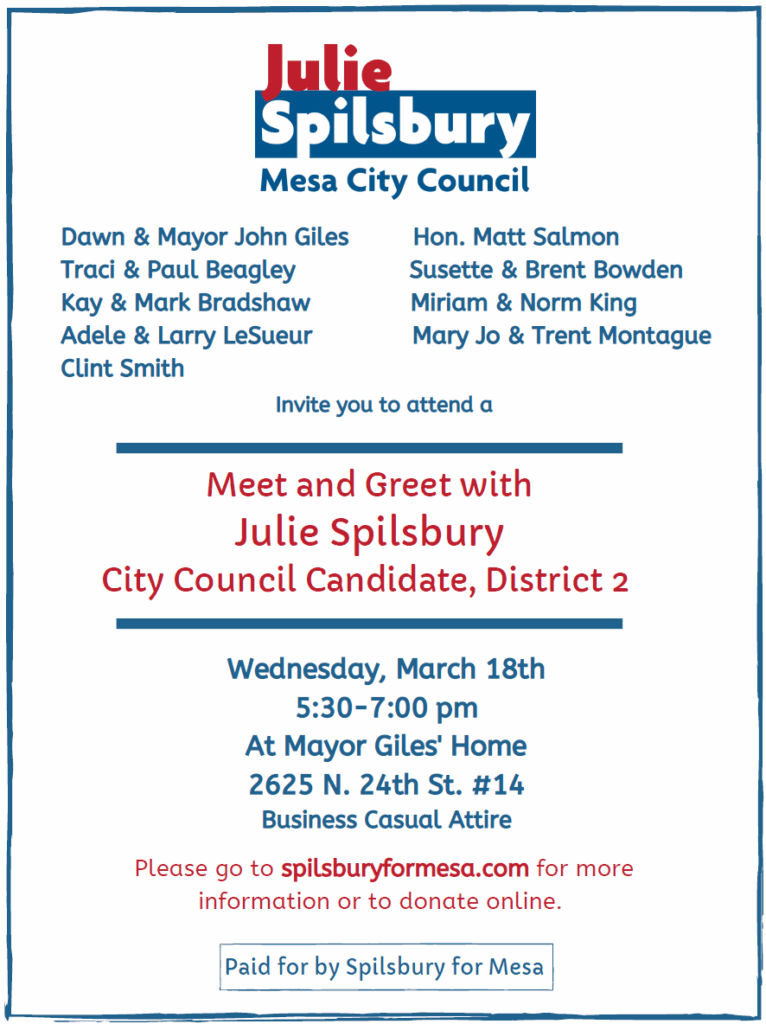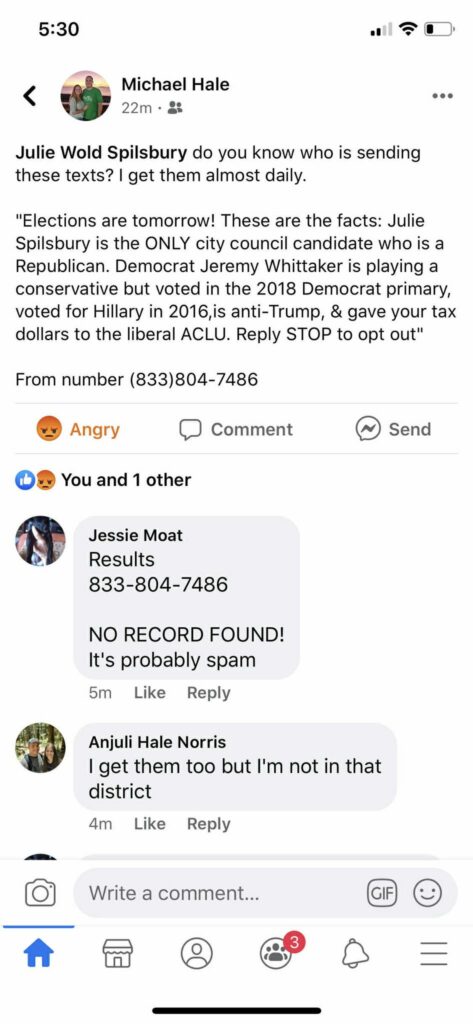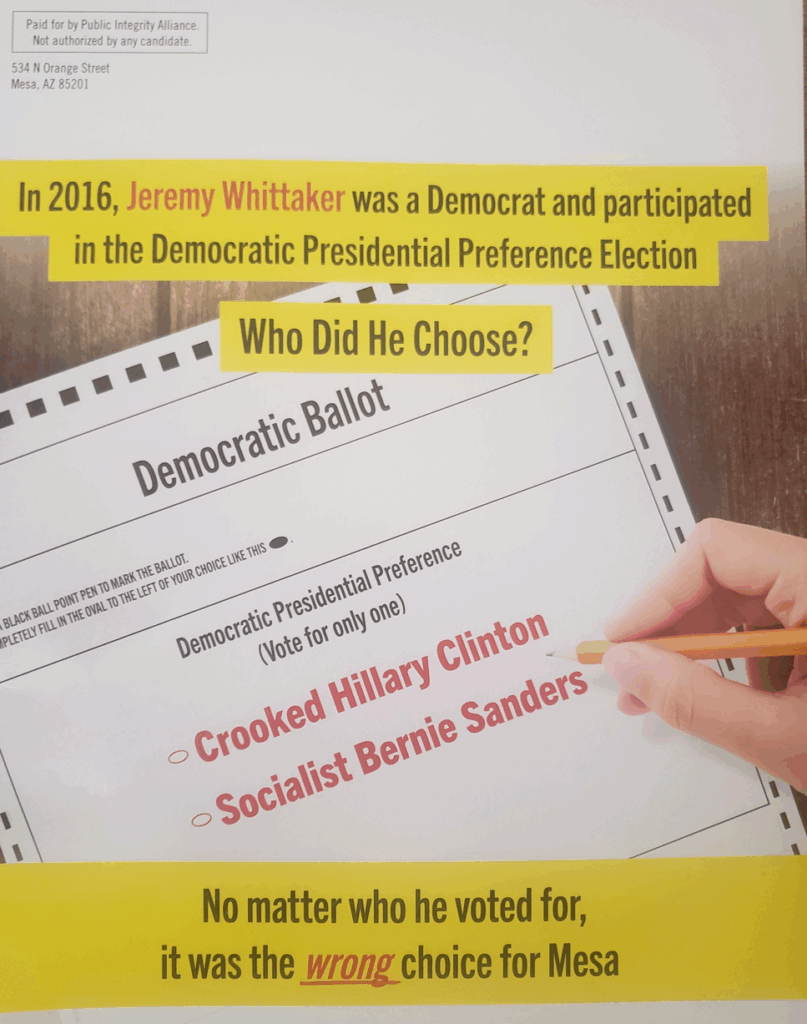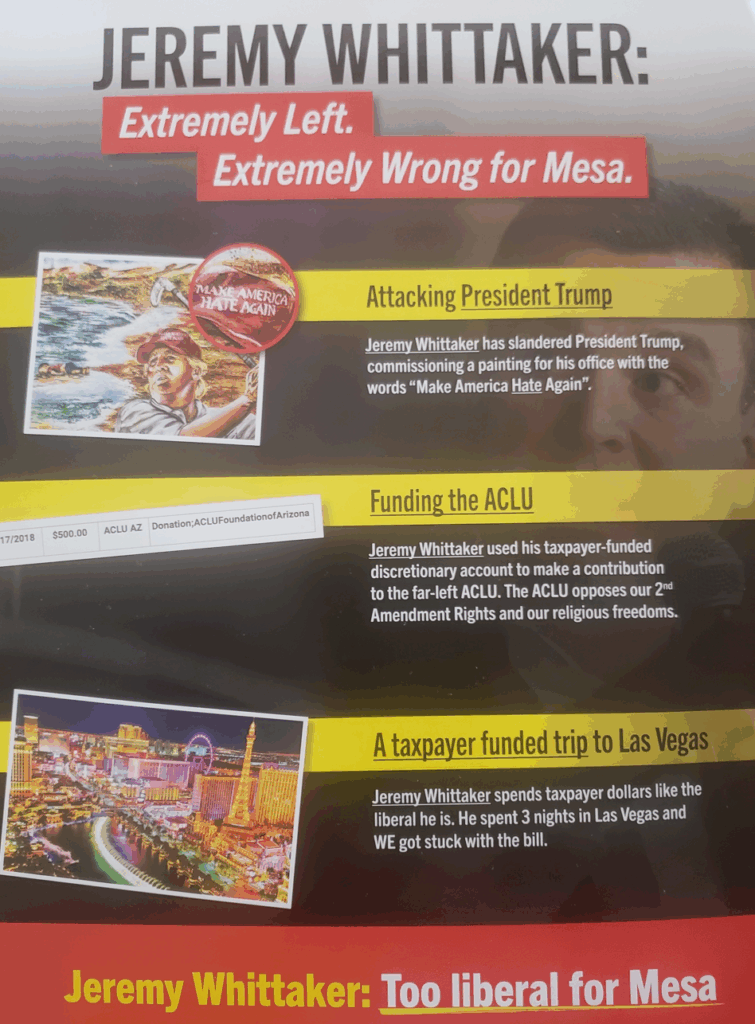Yes, there’s a Julie Spilsbury recall underway—and if you live in Mesa, you’ve probably already called or texted me about it. I’ve been inundated from people asking me to call out the hypocrisy. So here goes, I remember the 2020 race like it was yesterday: anonymous blasts, church-network house parties, and a dark-money auxiliary humming in the background. Five years later, the cast hasn’t changed and neither has the script. This post is for anyone who still wonders why our “nonpartisan” city politics keeps feeling like a coordinated campaign.
Julie Spilsbury’s positions blow with the political wind. That’s not leadership—her playbook comes directly from her teacher Ex-Mayor John Giles: he perfected the same dance—small-government Republican branding in Mesa, then end-of-term national endorsements of Democrats when it no longer cost him. Two peas, same pod.
When a campaign looks like a church meeting
Start with the invite to Spilsbury’s early “Meet & Greet.”


Everyone on that original host list comes from the same church. So what exactly was this—religious meetup or political campaign? Honestly, I couldn’t tell the difference, and I’m not sure how the IRS would either.
Federal rules are crystal clear: churches (and other 501(c)(3)s) cannot intervene in campaigns. That means no using church directories, ward contact lists, or official communications to rally voters for a candidate. In Mesa, the overlap between ward life and campaign life is so tight you need a microscope to see daylight. That’s not “community engagement.” That’s a religious machine doubling as a political one—and it puts both fair elections and tax-exempt status at risk.
Oh—and Spilsbury, the bishop’s wife? Yeah, I’m sure that’s just a coincidence.
Manufactured outrage beats municipal policy
In 2020, her network didn’t talk about streets, water, housing, or public safety. They blasted some voters with messages calling me “anti-Trump,” while others got the mirror image—“conservative extremist”—depending on what would push their buttons. Two opposite stories, same senders, same race. That isn’t communication; it’s micro-targeted outrage.



At the very same time, the same circle was busy producing parody videos for a different audience. If you’re still wondering why normal voters grow cynical and look for “disruptors,” this is why: fake brands, shifting identities, and politics by focus group.
The “Integrity” Alliance that does the opposite
Enter the Public Integrity Alliance—Spilsbury’s favorite auxiliary, run by Tyler Montague. It’s a 501(c)(4) “social welfare” outfit—what most people call dark money—because it can spend in elections without disclosing donors. In Mesa cycles it’s poured serious cash into mailers, robocalls, online ads, and door programs. All while lecturing everyone else about “integrity.”
It’s the oldest Mesa trick in the book: accuse others of being the extremists, fund it with anonymous dark money, then hide behind the candidate smiling from the “high road.”
Here’s the proof: PIA’s independent expenditure filing with the City of Mesa, showing tens of thousands of dollars poured directly into those very attack ads.
And here’s the irony: while their allies were blasting me as “anti-Trump,” Montague and his friends were busy making parody videos mocking Trump himself. One video, covered by Phoenix New Times, depicted Trump being “schlonged,” produced by the very same Public Integrity Alliance. (Phoenix New Times)
Even worse, those anti-Trump mailers that flooded Mesa in 2020? They weren’t some anonymous neighborhood project. They were financed and distributed by the Public Integrity Alliance itself — the largest dark-money operator in our city’s history.


This is classic Mesa politics: use the church network to attack opponents while pretending the candidate herself is “above it all.” Let the “Integrity” Alliance take the swings, while Spilsbury smiles from the high road. This is the same Group that sent out the anti-trump mailers in the campaign.
Here you’ll find their campaign finance form
Follow the money (and the ward lists)
To my friends at the Church: take a look at the actual contributor roster from Spilsbury’s reports and tell me you don’t notice a pattern. Over and over you see the same family networks, the same ward surnames, the same social circles—all bankrolling a “nonpartisan” city race.
And while we’re on the subject of “diversity,” let’s talk about her official “Supporters” page.
Spilsbury’s campaign published what they call an endorsement list. You can read it for yourself here: Supporters — Spilsbury for Mesa (PDF).
Scroll through it. Page after page is filled with the same ward families, the same church leaders, the same closed circle of insiders. Is this really an endorsement list—or just a ward distribution list dressed up as one?
To my friends at the Church: does this look like broad-based community diversity? Or does it look like a contact sheet repurposed for campaign turnout? When the overlap is this overwhelming, I’m not sure how the IRS—or any fair-minded voter—could tell the difference.
Silence when it mattered; noise when it was safe
When anti-Trump flyers circulated in her circle years ago, Spilsbury stayed quiet and let proxies do the work. Later, when it became politically safe, the branding shifted and the endorsements flowed. Meanwhile, Giles kept the “Republican mayor” façade during election cycles, then found his voice right as he was exiting. Same method, different mask.
Legal intimidation is part of the playbook
Lest anyone forget: nearly a decade ago the City of Mesa tried to cudgel my campaign with a cease-and-desist for using the city logo—demanding I surrender or destroy signs. Political speech is protected; we had to bring in outside counsel to say the obvious. That’s the climate here: if the machine can’t out-argue you, it will try to out-lawyer you. Luckily their threats had no weight and I had an awesome attorney response.

Giles, as a reminder—because the symmetry matters
Giles, the hand that picked Spilsbury, spent years selling small-government branding locally while voting for new taxes, then capped his career with splashy national endorsements once there was no political risk left. Loud at the end, quiet when it counted. And here’s the bigger problem: people like Giles and Spilsbury can’t see that they themselves are the cause of Trumpism. When it mattered most, they were fake—silent to protect their careers. Only at the end of their terms, when there was nothing left to lose, did they suddenly discover “righteousness.” That’s not courage. That’s opportunism. The very definition of fake.
“I honestly think I need to do this as my role as mayor. I need to be an advocate for what’s in the best interest of my city… I’m convinced the top of her agenda is doing what’s in the best interest of the United States.”
— Mayor John Giles, explaining his endorsement of Kamala Harris despite being a registered Republican
Sorry Dorean, The Church will defeat you.
I don’t know Dorean Taylor, the person opposing Spilsbury. But I do know one thing: she stands no chance against the systematic church electioneering machine she’s up against. What we’re watching isn’t a debate about policy or competence. It’s a closed circuit where church lists become invite lists, invite lists become turnout lists, and “Integrity” groups do the opposite of what they’re named. Messaging shifts depending on the audience, legal threats fill in where arguments fail, and “nonpartisan” is nothing more than a fig leaf for a very partisan machine.
Mesa deserves straighter talk and cleaner politics than this. If our city races are going to stay nonpartisan on paper, they should act nonpartisan in practice—without ward directories doubling as field programs and dark-money mailers telling each audience a different story.
If you like the machine, you already know how to vote. If you don’t, well this is Mesa, find a new home.

